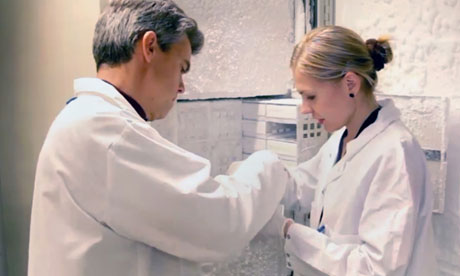Targeting tumors: Ion beam accelerators take aim at cancer

|
EVENT: Advances in the design and operation of particle accelerators built for basic physics research are leading to the rapid evolution of machines that deliver cancer-killing beams. Hear about the latest developments and challenges in this field from a physicist, a radiobiologist, and a clinical oncologist, and participate in a discussion about cost, access, and ethics at a symposium organized by the U.S. Department of Energy’s Brookhaven National Laboratory (“Targeting Tumors: Ion Beam Accelerators Take Aim at Cancer”) and at a related press briefing—both to be held at the 2014 meeting of the American Association for the Advancement of Science.
WHEN: Sunday, February 16, 2014, 8:00 a.m. Central Time (symposium) and 11:00 a.m. (press briefing)
WHERE: Symposium: Hyatt Regency Chicago, Grand Ballroom A; Press Briefing: Swissotel, AAAS briefing room, adjacent to the newsroom, second floor.
WEBCAST: For reporters unable to attend the meeting, the press briefing portion will be webcast live and archived in the AAAS meeting newsroom.
DETAILS: As particle accelerator technology has been incorporated into the clinical practice of treating cancer, the trend has been toward less expensive, more versatile particle beam delivery systems, designed for improved efficacy and greater access for cancer patients around the world. Proton and ion beams are particularly attractive in treating cancer because they deposit most of their energy where the beam stops (i.e., in the tumor) rather than in the tissue through which they travel. As a result, particle beams can deliver cell-killing energy with extreme precision, allowing less damage to adjacent healthy tissue than conventional x-ray or electron radiation treatments.
Protons have been in use for some time at several facilities in the U.S. Beams of heavier ions such as carbon offer promise of even greater efficacy, based on the physics and expected radiobiological effects, as well as on preliminary evidence from facilities operating in Europe and Japan. There are currently no carbon therapy cancer treatment facilities operating in the U.S., and while experience from Europe and Asia suggests that the cost of building one would be considerable, the U.S. National Cancer Institute recently announced a funding opportunity to encourage and support plans for a center for particle beam radiation therapy research.
This symposium and press briefing will explore the scientific rationale behind hadron beam therapy (using protons and heavier ions such as carbon) from the perspectives of a physicist who designs state-of-the-art particle accelerators, a radiobiologist exploring how those particle beams affect cells and tumors, and a radiation oncologist in clinical practice. The session will also address the questions of how to test the relative efficacy of hadron therapy versus conventional radiation treatment and ethical issues related to clinical trials, how to leverage scientific expertise to bring advances driven by basic research to the benefit of society at large, and potential ways to increase treatment access for patients through cost-saving accelerator designs.
SPEAKERS
Stephen Peggs, Physicist, Brookhaven National Laboratory, Adjunct Professor, Stony Brook University (Advances in Accelerator Science Deliver Precision Beams for Cancer Therapy)
Kathryn Held, Radiation Biologist, Associate Professor of Radiation Oncology, Harvard Medical School; associate radiation biologist, Massachusetts General Hospital (Charged Particles for Cancer Treatment: The Benefits of Ions over Photons)
Hak Choy, Chair, Department of Radiation Oncology at the University of Texas Southwestern Medical Center (The Clinical Perspective: Does Proton/Ion Beam Therapy Work?)
Discussant: Ken Peach, Professor, Particle Therapy Cancer Research Institute at Oxford Martin School, Oxford University
Moderator: James Deye, Program Director, Division of Cancer Treatment and Diagnosis, Radiation Research Program, National Cancer Institute
This session was organized by Karen McNulty Walsh, Media & Communications Office, Brookhaven National Laboratory with Co-Organizers Stephen Peggs, Physicist, Brookhaven National Laboratory, and Eric Colby, Office of Science, U.S. Department of Energy.
For more details, including links to talk summaries, see: http://aaas.confex.com/aaas/2014/webprogram/Session6784.html
###
Brookhaven Lab’s role in this research and this symposium is funded by the DOE Office of Science.
DOE’s Office of Science is the single largest supporter of basic research in the physical sciences in the United States, and is working to address some of the most pressing challenges of our time. For more information, please visit science.energy.gov.
One of ten national laboratories overseen and primarily funded by the Office of Science of the U.S. Department of Energy (DOE), Brookhaven National Laboratory conducts research in the physical, biomedical, and environmental sciences, as well as in energy technologies and national security. Brookhaven Lab also builds and operates major scientific facilities available to university, industry and government researchers. Brookhaven is operated and managed for DOE’s Office of Science by Brookhaven Science Associates, a limited-liability company founded by the Research Foundation for the State University of New York on behalf of Stony Brook University, the largest academic user of Laboratory facilities, and Battelle, a nonprofit applied science and technology organization.
###
Karen McNulty Walsh
.(JavaScript must be enabled to view this email address)
631-344-8350
DOE/Brookhaven National Laboratory
Print Version
Tell-a-Friend comments powered by Disqus





